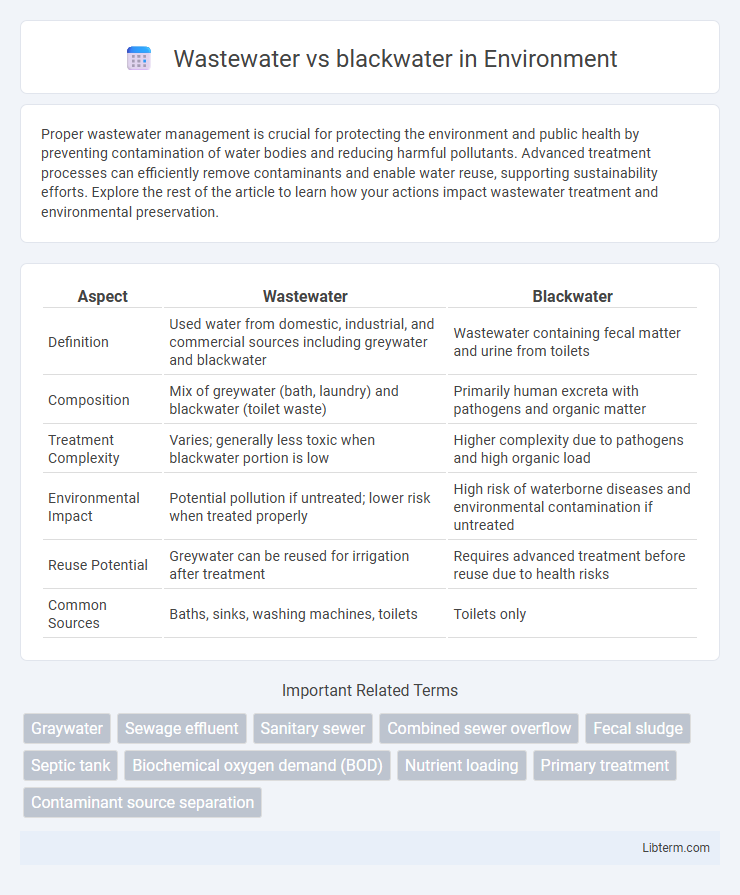Proper wastewater management is crucial for protecting the environment and public health by preventing contamination of water bodies and reducing harmful pollutants. Advanced treatment processes can efficiently remove contaminants and enable water reuse, supporting sustainability efforts. Explore the rest of the article to learn how your actions impact wastewater treatment and environmental preservation.
Table of Comparison
| Aspect | Wastewater | Blackwater |
|---|---|---|
| Definition | Used water from domestic, industrial, and commercial sources including greywater and blackwater | Wastewater containing fecal matter and urine from toilets |
| Composition | Mix of greywater (bath, laundry) and blackwater (toilet waste) | Primarily human excreta with pathogens and organic matter |
| Treatment Complexity | Varies; generally less toxic when blackwater portion is low | Higher complexity due to pathogens and high organic load |
| Environmental Impact | Potential pollution if untreated; lower risk when treated properly | High risk of waterborne diseases and environmental contamination if untreated |
| Reuse Potential | Greywater can be reused for irrigation after treatment | Requires advanced treatment before reuse due to health risks |
| Common Sources | Baths, sinks, washing machines, toilets | Toilets only |
Understanding Wastewater: Definition and Types
Wastewater encompasses all water that has been used and contaminated by human activities, including greywater and blackwater. Blackwater specifically refers to wastewater containing human waste, such as sewage from toilets, which requires more rigorous treatment due to higher levels of pathogens and organic matter. Understanding the distinct types of wastewater is crucial for effective treatment strategies and environmental management.
What is Blackwater? Key Characteristics
Blackwater refers to wastewater that contains human waste, including urine, feces, and flush-water from toilets. It is characterized by a high concentration of pathogens, organic matter, and nutrients, making it more hazardous and requiring specialized treatment processes. Unlike graywater, blackwater typically demands stringent sanitation measures to prevent health risks and environmental contamination.
Wastewater vs Blackwater: Core Differences
Wastewater encompasses all used water from households and industries, including greywater from sinks, showers, and laundry, while blackwater specifically refers to water contaminated with human waste from toilets. The primary difference lies in contamination levels; blackwater contains pathogens and organic pollutants requiring advanced treatment, whereas greywater within wastewater generally has lower contamination. Understanding these distinctions is essential for effective wastewater management and treatment system design.
Sources of Wastewater and Blackwater
Wastewater originates from various sources including domestic, industrial, and stormwater runoff, encompassing greywater from sinks, showers, and laundries. Blackwater specifically refers to wastewater containing human waste, primarily from toilets, and is characterized by high concentrations of organic matter and pathogens. Understanding the distinction between these sources is crucial for effective treatment and management of wastewater systems.
Treatment Processes for Wastewater and Blackwater
Treatment processes for wastewater typically involve primary sedimentation, biological treatment such as activated sludge or biofilm reactors, and secondary clarification to remove organic matter and suspended solids. Blackwater treatment requires more intensive methods including advanced biological treatment, pathogen removal through disinfection techniques like chlorination or UV radiation, and often nutrient removal to address nitrogen and phosphorus. Both treatment systems aim to reduce contaminants, but blackwater treatment demands stricter controls due to higher concentrations of pathogens and organic load.
Environmental Impacts of Wastewater and Blackwater
Wastewater encompasses all used water from domestic, industrial, and stormwater sources, while blackwater specifically refers to sewage containing human waste and urine. The environmental impacts of untreated wastewater include water pollution, eutrophication, and harm to aquatic ecosystems due to nutrients and pathogens. Blackwater poses higher risks because of its concentrated organic matter and pathogens, leading to severe contamination of groundwater and surface water if not properly treated.
Health Risks Associated with Blackwater
Blackwater, containing fecal matter, urine, and flush water, poses significant health risks due to the presence of pathogens including bacteria, viruses, and parasites that can cause diseases such as cholera, hepatitis, and typhoid. Unlike general wastewater, blackwater requires thorough treatment processes like biological treatment and disinfection to prevent contamination of water bodies and reduce exposure risks. Improper handling or leakage of blackwater can lead to severe public health hazards, including the spread of waterborne illnesses and environmental pollution.
Regulations Governing Wastewater and Blackwater
Regulations governing wastewater and blackwater differ significantly due to their varying contamination levels and treatment requirements. Wastewater regulations, such as the Clean Water Act in the U.S., set limits on pollutants discharged into surface waters, emphasizing primary treatment and pathogen reduction. Blackwater regulations demand stricter controls and advanced treatment processes to manage human waste and harmful pathogens, often requiring separate handling, septic system standards, or connection to sewage treatment plants to protect public health and the environment.
Sustainable Management Solutions
Wastewater management involves treating all used water from domestic, industrial, and commercial sources, whereas blackwater specifically refers to sewage containing human waste and pathogens. Sustainable management solutions for wastewater and blackwater emphasize resource recovery, energy efficiency, and minimizing environmental impact through technologies like anaerobic digestion, constructed wetlands, and decentralized treatment systems. Implementing circular economy principles in blackwater treatment can restore nutrients and generate biogas, reducing reliance on chemical fertilizers and fossil fuels.
Future Trends in Wastewater and Blackwater Treatment
Innovations in wastewater and blackwater treatment are driving the adoption of advanced membrane bioreactors and anaerobic digestion technologies that enhance nutrient recovery and energy efficiency. Integration of Internet of Things (IoT) sensors and artificial intelligence (AI) is revolutionizing real-time monitoring and predictive maintenance, significantly reducing operational costs. Emerging trends emphasize circular economy principles, transforming blackwater into valuable resources like biogas and fertilizer, aligning with sustainable urban water management goals.
Wastewater Infographic

 libterm.com
libterm.com